
SUBTEXT E-Newsletter Fall 2015

Welcome From Our Chair
KEEPING IN TOUCH
By Charles Tung, Acting Chair 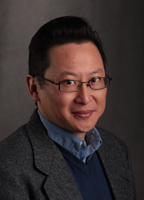
Greetings, alumni! I have the Pyrrhic pleasure of serving as chair while Dr. Bullón-Fernández takes her much-deserved sabbatical. Among many other things, she led us through two arduous reviews of our department and its programs last year, and we wish her the best for a year filled with rest and a revivifying focus on her own scholarly work!
I have a lot of news to share, but let me first start with you! We learned many wonderful things about you from our program review. Thank you for the nearly one hundred survey responses we received. We were very pleased to discover that 20% of you are executives or managers, 22% are teachers or professors, 18% are lawyers or legal professionals, and 14% of you have job involving writing and editing. These figures are much higher than the nationwide average. How many of you went on to graduate school? 47%! What did you pursue? Education, law, government, international studies, doctorates in literary studies, and MFAs in creative writing. Nearly a third of you double-majored, pairing your passion for literature and creative writing with French, philosophy, history, political science, humanities, psychology, Spanish, fine arts, business, communications, film studies, and women and gender studies.
We realize that this is not the whole picture and that there may be countless other ways in which your degree in English or English-CW or Film Studies has benefited you. We know from a survey of our current students that they overwhelmingly value receiving a solid disciplinary foundation and discerning their life paths. When asked about the best part of their studies in the English Department, they most often cited their professors and the development of writing skills. The departmental activity they found most beneficial was academic advising from an English faculty member. How about you? Our current students are eager to learn from your experiences in and beyond college. If you have news of accomplishments, thoughts about the value of your degree, or updates about your life, please do share them with us at english@seattleu.edu!
Now let me say a few words about what your professors have been up to this last year.
- Dr. Koppelman is now the Director of the Core Curriculum at SU and will be bringing the distinguished science-fiction novelist Ursula Le Guin to campus in October! The department is eager to host an event for students later in the year that focuses on the power of literature to engage ecological and social catastrophe.
- Dr. Hillard, chair of the Student Outreach and Professional Development Committee, has worked hard to offer workshops on career planning and grad school application workshops. She is also the driving force behind the revival of this newsletter.
- The department has been thinking hard about where we can begin making professional preparation not just a service but an integral part of curriculum. One of those places is our new Writing Studies minor. Dr. Johnson-Bube, who also serves as the University Core Writing Consultant, is the director of this exciting new program.
- Dr. Roberts is the Director of Women and Gender Studies and is also the co-founder of the Indigenous Initiatives programming on campus.
- Dr. McDowell is the Director of University Honors and will be proposing an expansion of the program that will be good for the humanities.
- Jen Heckler is serving as the interim Director of the Writing Center, after Prof. Nichols retired last year. His crowded retirement party showed how well he was regarded and how much he'll be missed.
- Father Leigh brought the regional conference Christianity and Literature to Seattle University last spring and enlisted many of his colleagues to help chair the panels.
- The members of your department continue to win awards. Following the previous year's wins-Dr. Koppelman received the A&S Teaching Award; Dr. Smith received the students' Advisor of the Year Award; and Dr. Kill received the Award for Advancing Inclusion in Academic Life-we're proud that Dr. Hawley won the Outstanding Contract Faculty Award, and our administrative assistant Stephanie Lewis won the Outstanding Staff Member Award!
There are many other achievements, which you can read about in THE ACHIEVEMENTS SECTION, so I will stop here. Our faculty-who cared for you while you were here, who sharpened your skills and deepened your views-continue to do excellent work. Because of that work, the English Department and its programs are strong. We'll be fine-tuning our curricula to make them even stronger! If you want to support us in this work, please feel free to send us your thoughts, and please consider making a donation of any size. You can contact our Director of Development, Jaime Jamison at jamisonj@seattleu.edu in regards to donations.
Department News
Directing the Writing Center 1993-2015: So What?
By Larry Nichols, Director of the Writing Center
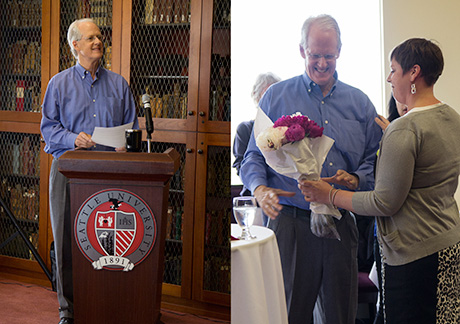
Because students never left my class or their time in the Writing Center without completing a reflective essay, it's only sweet justice for me to leave Seattle University with my written reflections.
In addition to my ongoing passions for writing and learning, I brought my love of improvisation to directing the Writing Center. As they engaged in writing and learning with me, consultants also experienced the Center as an evolving improvisation where everyone played a leading role. As increasingly skilled improvisers, together we learned that rigorous work is often best done playfully and that to promote the best work, an inspiring question trumps any proclamation.
One distinguished colleague's comment, "Who are these people?" in response to hearing consultant research presentations, still makes me proud of the consistently outstanding academic work my students and consultants accomplished. I'm especially gratified by how many consultants have carried what they learned in the Writing Center into crafting successful and satisfying lives beyond SU.
Much of my students' research continues to animate my life. For example, several years ago a writing consultant's research on perfectionism and writing helped me come out as a recovering perfectionist. In my ongoing recovery, I'm more often releasing impossible, immediate expectations for myself; doing so makes me more often both kinder to others and more fully the person and writer I intend to be. May my fellow perfectionists (You know who you are) know a similar, continuing grace.
Engaging in work with Dr. Bean on assignment design also remains as a signature element of my years at SU. That work stimulated so many interesting conversations among faculty and students and repeatedly illustrated how clear, focused, and meaningful assignments motivate student learning and writing. By extension, that work showed us that students who bring us an engaging assignment more easily transform their good intentions and Writing Center sessions into writing they can be proud to have produced.
Years of other lively conversation brought me to deeply value narrative and argument as companions in meaning-making. However, I came to believe that compelling narrative leads readers to meaning just as compelling argument speaks meaningfully to real readers. And further, though writers may initially identify only as a narrative or argumentative writer, developing knowledge and skill in both genres makes us more critical and creative thinkers who can create writing that is both soulful and effective.
I will be forever grateful to the SU writing consultants who enriched my life as we practiced saying yes, explored radical kindness, and embraced real failure. Beyond what you taught me, thank you for collaborating with me to create and sustain such a vital center for learning and writing. For all my former students, here's to your passions for great conversation, deep learning, and compelling writing. And however you create it, here's to your ongoing success and well-being.
Christina Roberts's Indigenous Initiatives Focus on Student and Community "Honor…and Solidarity"
By Stephanie Lewis
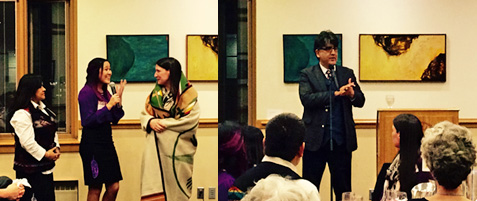
Since joining the English Department in 2007, Dr. Roberts has focused on sharing her knowledge of early American and Native American literatures, as well as raising campus awareness about contemporary issues of importance to Native American and Indigenous individuals and communities.
In the fall of 2014, alongside a dedicated Partnership Council comprised of Seattle U students, alumni, staff, faculty, and community members, English faculty Dr. Christina Roberts launched Indigenous Initiatives, a strategic set of goals focused on Native American student success, enhancing campus outreach and recruitment efforts geared toward Native American youth, and securing sustainable resources to ensure that all Seattle U community members have opportunities to learn, bear witness to, and speak to the unique histories and vibrant living realities of Native American and Indigenous peoples.
Earlier this year, the English department and Dr. Christina Roberts played significant roles in hosting local author Sherman Alexie and Annette Kolodny, College of Humanities Professor Emerita of American Literature and Culture. Sherman Alexie's electrifying campus visit in February likely made a lasting impression for the 300+ participants in Campion Ballroom. Dr. Roberts celebrates the fact that Alexie, author of Blasphemy (2012) and many other works, "may have set a cursing record." His visit also included a faculty development workshop emphasizing best practices when working with Native American students. Annette Kolodny's visit in April provided an opportunity to discuss the cultural legacies associated with the colonization of the Americas and the Doctrine of Discovery. Professor Kolodny spoke about debunking the mythology of the empty seas before Columbus and the importance of acknowledging the lasting harm and legal ramifications of the 15th century Papal Bull, "Inter Caetera." While on campus, Kolodny also delivered a faculty development workshop focused on working with communities outside of one's own, which focused on her work with Native American tribes in writing In Search of First Contact: The Vikings of Vinland, the Peoples of the Dawnland, and the Anglo-American Anxiety of Discovery(2012).
In addition to bringing these speakers to campus, the Indigenous Initiative hosted a conversation about Juniperio Serra's canonization and how that impacts the relationship between the Catholic Church and Indigenous people, and a screening of Honor Totem, a documentary about the community art project rose from the August 2010 fatal police shooting of Williams, a First Nations woodcarver.
Part of what draws Dr. Roberts to this work are two questions that shaped her educational and Ph.D. journey: she wondered why she didn't encounter Native American literature until her junior year of college and why her family experienced disproportionate rates of alcoholism, domestic violence, and suicide. Her questions drew her into the past and she became fascinated with the study of early American literature, postcolonial and feminist theories, Native American literatures, and eventually settler colonial studies. Her dissertation work focused on intergenerational trauma and healing in Indigenous women's poetry and fiction, and her research included tribally specific information about the distinct and persistent patterns of colonization in both the United States and Canada.
At Seattle University, Dr. Roberts met Fr. Patrick Twohy, who has been working with Native communities for over forty years. Indigenous people face erasure everywhere, including on college campuses because the community is often considered statistically insignificant. Fr. Twohy wanted to see a campus-wide initiative at SU and felt a Native American person should spearhead the project. Familiar with her work, personal history, and how she thinks strategically, he reached out to Dr. Roberts. The two have been working together since 2012 and secured seed funding from donors Tricia and Steve Trainer, which allowed them to bring Alexie and Kolodny to campus.
At the moment, the Partnership Council works "to honor the Indigenous voice and presence among us by seeking greater solidarity with the guiding visions and endeavors of all Indigenous peoples. We cultivate an attitude of profound regard and appreciation of the core spiritual values of all Indigenous peoples and make visible the ongoing struggles for liberation, freedom, and sovereignty. We place the concern of Indigenous communities first and affirm the vital importance of Indigenous histories and contributions to our world."
Native American heritage month will feature a panel presentation on Wednesday, November 4th from 7-9pm "Honoring the Past and Celebrating the Present: An evening with Genjo Osho and Matika Wilbur." There will also be a film screening of The Cherokee Word for Water on Friday, November 13th at 4pm in the Wyckoff auditorium. Dr. Roberts is also excited about co-organizing an event featuring Deborah Miranda and Lorna Dee Cervantes on the evening of January 14th with new Director of the Center for the Study of Justice in Society, Dr. Gabriella Gutierrez y Muhs. Alumni are welcome attend all of these events.
Father Leigh Brings Christianity and Literature Conference to Seattle U.
By Elizabeth MacGregor ('15)
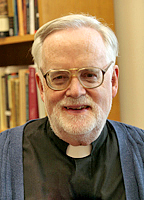
In May 2015, Seattle University hosted the West Coast regional Conference on Christianity and Literature. Organized by our own Father David Leigh, the two-day event featured over 20 panels and 65 presentations, three by Seattle University faculty. The conference topic this year was "Religion in Literature and Film in an Interdisciplinary Age." Gregory Wolfe, director of Seattle Pacific University's MFA in Creative Writing program and editor of IMAGE literary journal, provided the keynote address. Dr. Gabriela Gutierrez y Muhs of Seattle University also provided a formal address on the topic of "leaning in" in the English profession.
The participants at this year's conference came from 45 different universities; of those, some were neighbors to Seattle U, and some came from as far away as Tokyo and Dublin to participate. Father Leigh has been involved with the conference in some capacity for nearly 30 years. The conference holds approximately six meetings every year-one at the national level as well as several regional meetings. An annual journal is also published under the name Christianity & Literature.
This year's conference focused on the intersection of literature and film. Speaking to the more modern convention of including film alongside literature in such studies, Father Leigh says, "It's enriching, especially things like film, which is very close to literature. They both use a lot of narratives, a lot of character development, and so forth. … It fits together very easily and [everybody] is trying to see the connection between things. If you get too separated in the disciplines, all you know is a little bit about one subdivision of your own discipline, and you don't relate it to student's experience, or to life, or to the world."
Even better, he says, are the unexpected insights one can receive through interdisciplinary research. At this conference a few years ago, he discovered a film which was so well-made and which so closely fit into his teaching plan that he added it to the syllabus of a course mid-semester. "That's an example I think of when you go to a conference and you learn about new books, or new movies, or new critical approaches," he says, "and you also get to try your ideas out on somebody else. You get somebody listening to you. That's what conferences are for-they spark your interest in new areas."
Dr. Katherine Koppelman Takes the Core Director's Helm
By Elizabeth MacGregor ('15)
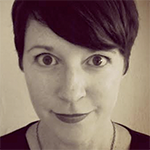
Dr. Katherine Koppelman will begin her role as Core Director this fall, after serving as Associate Director of the University's Core program in the 2014-2015 school year. An award-winning literature professor, Dr. Koppelman is the first Core Director to teach within the Core in addition to the administrative aspect of the job. "I thought that it was important that the Core director be teaching classes, so I'll teach one class per year," she says. "I am supposed to be doing things like running faculty workshops and talking about assignment design, and how to refine courses, or change learning outcomes… I don't really think I can do that unless I'm teaching the classes." Dr. Koppelman hopes that this will also enrich her own understanding of students' experiences within the Core and use that information to further streamline the thematic and interdisciplinary aspects that the Core program features.
The new Core program was instituted under the most recent Director, Jeff Philpott. The new curriculum sees students enrolling in 12 classes across four areas of learning objectives during their four years at Seattle University. One of Dr. Koppelman's aims in stepping into the new program is to bring together those four modules and make a more fluid and personalized experience for students, finding the common denominator of Core class experiences. She also hopes that her work with faculty discussion groups and working groups will provide clearer links between different disciplines within the Core.
In one of her first acts in her new position, Dr. Koppelman secured the visit of renowned author Ursula Le Guin to campus in October, as part of Seattle University's Common Text program, for which all incoming first-year students read Le Guin's novel Lathe of Heaven, met for discussion groups, and will continue to learn from the text during fall quarter
Although Dr. Koppelman will miss teaching full-time (especially Chaucer, who she cites as her favorite author to teach), she is embracing the duality of being both faculty and an administrator. Even more than that, Dr. Koppelman will be the first woman to serve as Core Director in the program's history. As she says, "I do think it's a big deal that students are going to see a woman standing up. And they do see that-when students come to campus for orientation, there are plenty of women who stand up and talk to them. There are far fewer women who stand up as faculty and as an administrative position. It's not that students at SU don't see women who are in positions of authority, but I think it's less likely that they see both of those things."
Alumni Initiatives on the Rise in Your English Department
By Molly Clark Hillard and Stephanie Lewis
The English Department needs the help and support of our alumni to continue to grow and improve in the years to come. To that end, we have important year-round initiatives in place that depend upon our alumni for success. Read on for more, and see the ends of articles for more about how you can keep in touch with your department.
Alumni Speaker Series
In January, the English Department kicked off its new annual Alumni Reading & Speaker Series with a double book launch for faculty member and alumna, Dr. Susan V. Meyers ('99). One crisp afternoon, Susan gave a presentation on her researched book Del Otro Lado: Literacy and Migration Across the U.S.-Mexico Border in the Casey building on campus. From there, English Department faculty, students, and alumni trekked over to Elliott Bay Books where an even bigger crowd watched Susan read from and speak about her novel, Failing the Trapeze. We were delighted to see several recent and not-so-recent alumni in attendance at this festive event.
We started the Alumni Speaker Series to showcase alumni scholarship and creative pursuits. We also wanted to create an event to bring our alumni back to campus each year to reconnect with each other and department faculty. This will be an annual event each winter, so our Puget Sound region alumni should look for an invitation in the fall.
Would you like to return to Seattle University as a reader of your academic or creative work, or as a speaker about your post-graduate career? If so, contact us at english@seattleu.edu
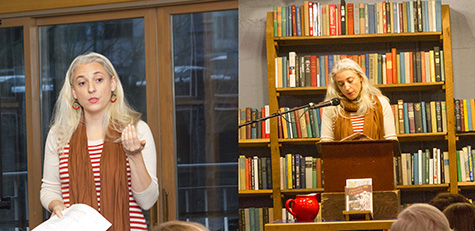
Career Night and Graduate School Information Night
Each year, the Student Outreach Committee hosts a panel of alumni (and English grads from other universities) who are doing interesting work in the world to come to Seattle University to talk to our students. On Career Night, the panel is made up of English alums who tell students their career and life narratives, and share insights about the paths they've carved for themselves. On Graduate School Information Night, the panel consists of English BAs who have gone on to graduate programs in many different fields. They, too, share their wisdom about post-baccalaureate programs.
Would you consider visiting Seattle University as a panelist for one of these events? If so, contact us at english@seattleu.edu
Creative Writing
By Susan Meyers, Director of Creative Writing
2014-2015 was a banner year for the Creative Writing Program. In the fall, program leadership turned over to Dr. Susan Meyers, an SU alum ('99) who joined the English Department faculty three years ago and now serves as Director of the Creative Writing Program. Along with welcoming Dr. Meyers into her new role, the Program was also thrilled to host Egyptian Poet and Stranger Genius Award Winner Maged Zaher as one of last year's Distinguished Visiting Writers. Maged delighted students in his Global Poetry class, a course that dug deeply into both poetics and international politics. Our second visitor last year was the ever-popular Kathleen Flenniken, the recent Washington State Poet Laureate who has taught several courses at SU during the past few years.
In addition, the Creative Writing Program hosted a dozen public events last year, including readings by notable national public figures such as Harvard's Stephen Pinker and PBS's Jeffrey Brown, as well as the launch of Susan Meyers' award-winning first novel, Failing the Trapeze, and the ever-popular launch of our latest issue of SU's own literary journal. Finally, by spring we were thrilled to hear about several of our recent grads being accepted into prestigious MFA programs, including those at Western Washington University and NYU.
This fall, we're off to another great start as we welcome SU alum Kevin Grange ('04) to deliver a reading and professional development presentation on Wednesday, November 4th from 4:00-6:00 in Bannen Auditorium. Kevin will be reading from his new memoir, Lights and Sirens, about his life working as a paramedic. Kevin's previous work of nonfiction, Beneath Blossom Rain, detailed his adventures hiking through the Himalayas. He will be reading from his work and sharing practice publishing advice. All are welcome to attend.
As the year presses onward, we're also excited to be welcoming two new fabulous to campus. The first is Kris Saknussemm, a wildly creative genre-bending author of 10 books whose work was recently featured in a sell-out anthology In the Shadows of the Towers: Speculative Fiction in a Post-9/11 World, which was recently favorably reviewed in The New Yorker. Kris will be teaching our first-ever course in Genre Fiction this winter quarter. We're very excited!
Winter quarter 2016 promises to be an exciting time, so stay tuned for news about upcoming events during that time frame, especially the multi-media art exhibit our second visiting writer, poet and artist Deborah Poe, will be hosting as part of her work with the students in her Multi-Media Poetry class, which will also be a brand new offering among our creative writing courses. Deborah Poe will be visiting us from her home institution, Pace University, in New York. We are very excited to be able to bring this national voice to Seattle U!
Film Studies
By Georg Koszulinski
The 2014-15 Academic Year marked the fifth year of the Film Studies program. After a large group of graduates last spring (25), fall of 2014 started with 73 majors and 11 minors. Film Studies offered 25 courses this year including Dr. Edwin Weihe's Film and Modernism in Paris course, which ran this summer in Paris. In addition to the regular offerings such as Art of Film, History of Film, Narrative Documentary Filmmaking, Filmmaking I, Producing, and Screenwriting, there were a great variety of electives this year that generated a lot of student interest including Westerns, Greater Middle East Cinemas, Malick, Trauma Across Media, Hitchcock, Scifi, International Queer Cinema, Conceptions of the Primitive, Hollywood Dream Factory, Godard, and History of TV.
Eight graduating seniors collaborated on three independently produced student thesis films: James Cashman's Love You Baby, T.J. Montoya's Portia Lynn: Another Kind of Love Story, and Brittany Hammer's Homewrecker. Our students also interned for the Seattle International Film Festival, Seattle Children's Theatre, Workhouse Creative, Northwest Film Forum, the Media Production Team in Seattle University's Admissions office, and with the head videographer for Marketing and Communications at Seattle University. Student films were screened at or selected for the Local Sightings Film Festival, Seattle True Independent Film Festival, the Seattle University Film Festival (SUFF), Seattle Transmedia and Independent Film Festival, the National Film Festival for Talented Youth (NFFTY), the Student Art Festival in Florida, and the CinéWomen magazine and online festival. Daniel Schiff and Jose Chalit's short film, The Surgeon General, won first place at SUFF. Daniel also directed and edited the short film, Out of Print, which won the NFFTY Audience Award. CinéWomen magazine interviewed Cherilyn Williams, one of our film students, regarding Insurration, a short film she wrote and co-directed.
The Film Studies program hosted a number of speaking events and workshops led by world-class filmmakers, producers, and directors. This winter, Sebastian Junger, the Oscar-nominated director of Restrepo and author of The Perfect Storm, led a workshop and discussion on documentary filmmaking. The American experimental filmmaker Ben Russell presented a selection of his works and gave a talk entitled, The Relativity of Time. Throughout the academic year, a host of other notable filmmakers visited our film classes, presented their works and led discussions on their filmmaking craft.
The Film Studies faculty also accomplished a lot this year. It was tenure track faculty member Georg Koszulinski's second year at Seattle University. This spring, he completed post-production on his feature-length documentary, Loa: Encounters with the Sacred Spirits of Haiti. He also served as a juror at the 10th Annual Florida Experimental Film Festival, and entries from his film essay series, Frontier Journals, continue to be programmed at film festivals internationally. His feature documentary focusing on migrant farmworker communities, Immokalee U.S.A., will be released through Fandor this fall. Adjunct faculty member Richie Meyer produced a feature film Amore Tra La Rovine (Love Among the Ruins), which had its North American premiere at the Seattle International Film Festival in June and its European premiere in May at the Verdono festival in Italy. Dan Thornton, who teaches screenwriting and filmmaking, was nominated for a 2014 Emmy Award for his feature film Welcome to Doe Bay.
Dr. Edwin Weihe, who started the Film Studies program and served as director for the first five years, stepped down in June. This year, Dr. Susan Meyers and Dr. Charles Tung will be co-directing the Film Studies program and a national search will begin for another tenured Film faculty member who will direct the program.
Departmental Honors
By Elizabeth MacGregor ('15)
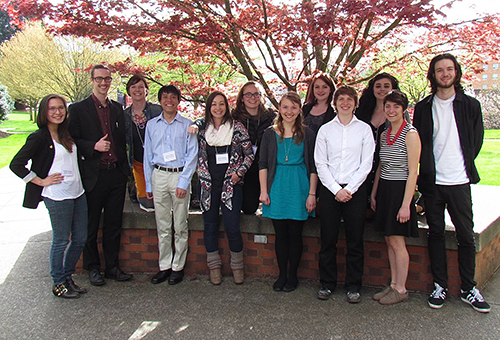
Now in its twelfth year, the English Department Honors Program welcomed ten senior students in 2014-2015. With topics ranging broadly from medieval patriarchy and gender studies to imperial vampirism and cyberpunk, these ten students were among the best in their class. Says Honors Coordinator Dr. Charles Tung, "This year, between 15% and 20% of the graduating class were honors students. I think the high percentage obviously speaks to the quality of students that Seattle University and our department are receiving. But it also says something about the strength of our curriculum that's preparing our students and teaching them how to pose substantive questions, generate well-supported answers, position their conversations in relation to other critical positions, and so forth." Dr. Tung, who took over as coordinator from Dr. Kate Koppelman in 2012, stresses that the larger cohorts of Honors students are "not the effect of lowering a bar to let people in," as applicants must be academically excellent to qualify: a 3.7 grade point minimum within the major, and a 3.5 cumulative.
This year's cohort was especially busy come spring, as eight members presented papers at the Northwest Undergraduate Conference on Literature, and four members presented papers at the National Conference on Undergraduate Literature-our best showing at national and regional undergraduate conferences ever. Moreover, all ten students participated in Seattle University's own research conference. As Dr. Tung says, "we've never had so many students demonstrating such strong scholarly, creative, and professional habits as we had this past year… One of our students gave five separate papers at all three conferences in the space of six weeks!"
The success of the Honors Program is bolstered by other efforts within the department: not only the English curriculum and the Honors Research Seminar, but also departmental groups such as the Student Outreach Committee, chaired by Dr. Molly Clark Hillard, which coordinates annual panels for grad school information, career insight, and more. Dr. Tung suggests that this emphasis on the shape of student's lives outside of the university comes from the department as well as students themselves. "Our students are becoming more and more savvy about the relationship of their projects to the future, whether that be a PhD, an MFA, or law school, or some other passion. Our department not only encourages but facilitates such strategic planning about what students' honors projects will do for them in that future they envision." Indeed, several of this year's Honors Program graduates have already begun to receive acceptance letters for grad schools as well as publication.
In addition to these professional and practical aims, Dr. Tung hopes to leave the Honors cohort with a lasting sense of connection to their projects. "The experience of Honors has so much to do with the quality of the experience of the work, which is different from the quality of the work itself. … You might produce high-quality work if you're miserable, but you may never return to it or build on it. But if you learn to love this high-quality work and strive to become reflective and articulate about why it matters, you will continue to deepen it, extend it, complicate it, thicken it. It becomes a lifelong learning project."
Would you be willing to sponsor a Departmental Honors student at a national or regional research conference? If so, contact us at english@seattleu.edu.
Faculty and Staff Achievements
Justine Barda worked as a programmer for Sundance and the Seattle International Film Festival, and traveled to festivals in Berlin, Toronto, and Tehran. She spoke on panels on subjects as varied as Antonioni's La Notte, festival programming criteria, and the future of film distribution.
María Bullón-Fernández recently published an article, “Poverty, Property, and the Self in the Late Middle Ages: The Case of Chaucer’s Griselda” in Mediaevalia, as well as an essay “Goods and the Good in the Confessio Amantis,” in a collection of essays, John Gower in England and Iberia: Manuscripts, Influences, Reception. She continues to serve on the Council of the Medieval Academy of the Pacific and has also been nominated by the Medieval Academy of America.
Lyall Bush last fall completed production of a food show pilot titled “What She’s Having.” This spring he delivered a talk on French cinema to audiences at the annual French festival. In February and March he hosted a five-week series on Michelangelo Antonioni in conjunction with Seattle University, the University of Washington and Seattle Art Museum. In May, just before announcing that he would step down as executive director of Northwest Film Forum in September, he hosted the Film Forum’s 20th anniversary gala.
Catherine Clepper contributed "Symphonies Olfactives; Les experiences de cinema odorant aux Etats-Unis a l'ere du parlant" to the anthology Techniques et technologies du cinéma, eds. André Gaudreault and Martin Lefebvre; trans. Anne Bienjonetti (Presses Universitaires de Rennes, 2015). She also led a workshop at the annual SCMS meeting in Montreal on the subject "Teaching Film History in the Digital Age."
Molly Clark Hillard was granted tenure and promotion to Associate Professor. She has contracts for two new essays, one on the fairy tale and visual art, and one on Charles Dickens and children’s literature. She is now at work on a second book, this one about the networking of contemporary and Victorian literature.
Robert Horton contributed articles on Joseph L. Mankiewicz and Alexandre Desplat to Film Comment magazine; did a reading at Elliott Bay Book Co. for his book Frankenstein (Columbia University Press); and in December ended a ten-year run as the curator of the "Magic Lantern" program of monthly film talks at the Frye Art Museum. In January he led a six-hour "Cinema Dissection" of Bride of Frankenstein at SIFF, and in May he lectured on "Time as a Character in Contemporary Films" at the Architectural Association in London.
Nalini Iyer was re-elected Secretary of the South Asian Literary Association, an Allied organization of the MLA in January 2015. She also served as a consultant to the KUOW series "Two Indias: Near and Far" which aired in November 2014. She recently had an essay, "Diasporic Subjectivity: Dhan Gopal Mukerji's Caste and Outcaste and Sadhu Singh Dhami's Maluka" accepted for the anthology Crossing Borders:Essays on Literature, Culture and Society. She also served on the Wing Luke Asian American Museum's Community Advisory Board for the exhibit "Belonging" which commemorates the 50th anniversary of the Immigration and Naturalization Act of 1965.
Georg Koszulinski presented new work at over a dozen international film festivals, independent theaters, and art spaces, including Dallas Videofest 27, Mexico City’s Jornadas de Reapropiación, and the Independent Days Film Festival held in Karlsruhe, Germany. This winter he served as a juror at the 10th Annual Florida Experimental Film Festival where he presented a juror’s program of recent work. In the spring Koszulinski presented Hallucinatory Maps, a selection of original work produced from 2007-2015, at the ExCinema film series in Seattle, WA. He recently completed post-production on his feature-length documentary focusing on Vodou in rural Haiti.
June Johnson Bube presented the talk, "On the Rinder's Highway of his life": The Communitarian Vision of Hope in Kris Saknussemm's Reverend America" at the Western Christianity and Literature Conference at Seattle University.
Stephanie Lewis received the College of Arts and Sciences Outstanding Staff Member award for 2014-15 this spring. Last summer, Dutton Young Readers made an offer to publish her Young Adult memoir. She will be working with Julie Strauss-Gabel, one of the most renowned editors in Young Adult literature, and the book is scheduled for publication in 2017. Stephanie was invited to Columbia College Chicago’s Story Week Festival of Writers in March where she participated in a panel on Young Adult literature and gave a presentation book promotion and publicity. She also taught a Young Adult fiction course at Hugo House from September through May.
Allison Machlis Meyer published a book review of Igor Djordjevic's Holinshed's Nation: Ideals, Memory, and Practical Policy in the Chronicles in the February 2015 issue of English Studies. Her article, “Multiple Histories: Cultural Memory and the Case of Anne Boleyn in Actes and Monuments and Henry VIII,” will be published in the next issue (9.2) of Borrowers and Lenders: The Journal of Shakespeare and Appropriation, due out this fall. She completed a chapter for an edited collection, Shakespeare/Not Shakespeare, titled “Accidental Erasure: Relocating Shakespeare’s Women in Philippa Gregory’s Cousins’ War Series,” about Shakespearean appropriation in modern historical fiction.
Richie Meyer produced a feature film Amore Tra La Rovine (Love Among the Ruins) in Ferrara, Italy with his wife Susan and Italian director Massimo Ali Mohammad. The film has its North American premiere at the Seattle International Film Festival in June and its European premiere in May at the Verdono festival in Italy. It is scheduled for several film festivals in the coming months.
Susan Meyers has been on the road a lot this year. Her first stop was in Nicaragua early last summer, where she took part in Seattle U's Nicaragua Immersion Program through the Office of Mission and Ministry. Later on during the summer, she spent a month at the Millay Colony for the Arts and served as a Visiting Writer at the Equality State Book Festival in Casper, Wyoming. Thereafter, during a fall quarter sabbatical, she traveled to Johannesburg, South Africa to take part in a creative writing pedagogy project with LGBTQ refugees at the University of Witwatersrand's African Centre for Migration and Society and to Mexico City, where she served as a Visiting Scholar Universidad Autónoma Metropolitana offering faculty workshops on university writing programs. This spring, Dr. Meyers presented at the CCCC and AWP national conferences and promoted her two new books: her novel Failing the Trapeze and her researched book Del Otro Lado: Literacy and Migration Across the U.S.-Mexico Border.
Benedict Stork's essay entitled "A Shared Pain: Archival footage and history as immanent cause" is forthcoming in the spring issue of Synoptique: An Online Journal of Film and Moving Image Studies. He was also a contributor to the website In Media Res for their theme week "Cellphone Witness" (his curator's statement and video choice can be found here).
Dan Thornton was nominated for a 2014 Emmy Award for his feature film “Welcome to Doe Bay". His short documentary “LFO’s and the Modern Day Debtor’s Prison was chosen as a featured short at the 2014 Social Justice Film Festival. He coproduced the feature–comedy “Worst Laid Plans," which will be released in 2015. Currently Dan is working on a documentary in the U.K. about acclaimed visually impaired landscape painter Keith Salmon. Production on that film wraps in September 2015.
Featured Alumnus: David Strand, '15
By Elizabeth MacGregor ('15)
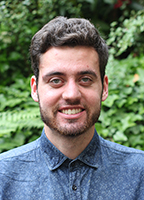
David Strand had a very busy senior year. As a double major in Creative Writing and Visual Arts, he quickly rose to the top of both programs and completed Departmental Honors projects for each. A remarkable feat already (as even one Honors project is a major commitment), David also earned the College of Arts and Science's McDonald award for highest GPA in the Creative Writing program. Now that he has graduated, David has time to reflect on where the past few years have taken him-and what directions he will be taking next.
Speaking to the perceived impracticality of his artistic fields, David says, "I feel lucky that I was even able to pursue my two majors, both as Visual Arts and Creative Writing, because it's really hard and really rare to have space carved out to pursue something creatively without any extra requirements attached to that at the end of the day." In addition to his work as an artist and writer, David is also capable of alchemically transforming skepticism into motivation: as he says, "I'm choosing to do these things and I know in the back of my mind that it won't turn into a job as easily-which means I'll just really have to work that much harder. But at the same time I can push myself creatively."
David's commitment to his creative work is evidenced by the magnitude of his Honors projects. For his Creative Writing major, he did extensive research and analysis on a medieval story concerning the legendary Lancelot and a knight named Galehaut, which has been somewhat neglected in favor of more straightforward stories of King Arthur. David's work with the text included a modern retelling of the tale, embracing its latent themes of homosexuality and eroticism. For his Visual Arts major, David completed a multimedia installation that was featured at The Factory gallery space in Capitol Hill as well as Seattle University's own Kinsey Gallery.
At the end of Spring quarter, David accepted a job as a curatorial assistant at the Frye Art Museum. He is currently working on the museum's largest-ever exhibit, a multimedia compilation of works by every past recipient of The Stranger's annual Genius Award. He is involved in local curatorial groups as well as upcoming work for a new arts zine. Graduate school is on the horizon, he says, but he isn't formalizing things yet. Although his life may seem a little overfull with so much talent and opportunity afoot, David can thrive in chaos. As he learned in literature, chaos can be a beautiful thing. "That's what making sense out of the world is to me," he says, "that you can't make sense out of it." He goes on to say, "I've become really interested in… thriving in the space that opens when you acknowledge a contradiction or a paradox, when you can't get there all the way. I see people or artists or authors who do that and so that's what I gravitate towards: how can you have that awareness, and then how can you operate with it in a way that's constructive?" David's work with each of his Honors projects proves that he is well on his way to becoming the very sort of conscientious and constructive artist that he admires.
Alumni Achievements
James Colombo ('10) was accepted into the Salt Institute for Documentary Studies Radio Program in Portland, Maine.
After graduating from Seattle University, Shasta Lewis ('10) deferred her admission to U Penn law school and spent four years serving on active duty as an all-source intelligence officer for the United States Army. Her analytical work was frequently recognized for its clarity and cultural sensitivity while she was deployed overseas. This fall, she will attend North Carolina State University to pursue a Master's in English Rhetoric and Composition. Having worked in a male-dominated field, she would like to study how gender and minority status shape professional rhetoric.
Alexandra Meany ('14) has been accepted into the MA program in English at Loyola Marymount University in Los Angeles, and she was offered a teaching fellowship.
James Whitely ('14) was admitted to no fewer than three prestigious MFA programs and he has selected New York University, one of the most highly ranked MFA programs in the country.
Student Achievements
Several of our students won awards and scholarships this year. Robin Curry is a Seattle University Distinguished Graduate for 2015. Kasey Deems is a recipient of the 2015-16 Naef Scholarship. Grace Goodwin is a recipient of the 2015-16 Naef Scholarship. She is a returning scholar. Matt Pritchard received the Scholastic Award given by the Student Executive Council for a personal essay titled, "On Life; or How to Dispose of Those Who Mattered Most." William Reckase received the McDonald Award for English-Literature, which is presented to the graduating student with the highest GPA in the major.
Vincent Chien published his paper, "To House a Moor and End a Marsh: Jane and Imperialism through Liminal and Structural Processes in Jane Eyre," in the National Conference on Undergraduate Research 2014 Proceedings. In the fall, he interned with the Japanese Cultural & Community Center of Washington. This fall Vincent will be heading to Shizuoka Prefecture in Japan to teach English as part of the JET Program.
Brian Cunningham is currently working on the trailer for the Seattle Latino Film Festival and interning on the Local Sightings Film Festival at NWFF. He's also working on a local feature right now called The Boy Who Lived Before(AC, gaffer).
Scott Lindquist completed his third year as a writing consultant at the Seattle University Writing Center. This year, he presented research at SUURA, published fiction in Fragments, and joined the Jesuit academic honors society, Alpha Sigma Nu. Recently, he worked as an assistant costume designer for Seattle University's production of Picnic and continues to serve as the Executive Editor of the founding committee for initiative to create an academic journal for undergraduate research at Seattle University.
Elizabeth MacGregor is the 2015 recipient of Seattle University's LeRoux Leadership Award. This spring, she presented at three conferences, including the National Conference on Undergraduate Research, where she presented two papers. Elizabeth is a member of the Tau Sigma Honor Society for Transfer Students, and her experiences as a non-traditional student have given rise to public speaking opportunities on behalf of Seattle University.
Alex Mullen began interning at local production company Workhouse Creative, served as the editor for SU thesis film Love You Baby, and published an essay on Internet piracy in the most recent edition of Argument Writing. Additionally, Alex developed and co-directed a short documentary about the phenomena of selfies and screened his short Green Energy at SUFF.
Brett Riley is an Orientation Advisor for the incoming class of 2019, one of Seattle University's largest incoming classes in recent years. He worked at the food bank at El Centro de la Raza as well as helping landscape the surrounding area to make way for their new low-income housing project.
Hannah Rips is the 2015 recipient of the Harriet Stephenson Business Plan Competition's Social Innovation Award. This past year, she worked on a variety of socially conscious entrepreneurial projects, from working with homelessness in Seattle to mitigating the gentrification effects in Yesler Terrace. She presented these projects at a national social-entrepreneurship conference in St. Louis. In addition, she has worked to spread awareness and raise money for a non-profit in Nepal suffering from the effects of the earthquake.
Cory Rodriguez returned to the Seattle International Film Festival this year as a paid Programming Assistant after interning last year in the same Department. He has done work for both the festival in the Spring and for the year-round events that the organization puts on such as One Reel during Bumbershoot. Cory just got a job as the Programs Assistant at Three Dollar Bill Cinema.
Siri Smith made the transition from Bellevue College to Seattle University last fall. A recipient of the Loyola Scholarship, Siri has been writing for Seattle University's Spectator and has been on the Fragments literary magazine staff all year.
Grace Stetson interned at Northwest Film Forum as the Membership Coordinator, where she assisted in the organization's membership-donor overhaul (which included working with Capitol Hill businesses to provide joint benefits to patrons) and in the organization's 20th anniversary Fundraising Gala in May.
Cherilyn Williams wrote and directed two short films, Morphean and Insurration. Insurration was selected for the Student Art Festival in Florida and for CinéWomen magazine and online festival. CinéWomen magazine will publish a 7-page interview regarding Insurration and Cherilyn's film work as a whole. In addition to this, Cherilyn will also be working with Twisted Twins Productions in the near future on some of their upcoming projects.
Subtext Contributors
Editor-in-Chief: Molly Clark Hillard
Managing Editor and Web Design: Stephanie Lewis
Send Us Your News
We’re counting on you to keep us informed! Send Subtext all of your exciting career, continuing education, and other professional developments, and we will feature them in our next installment. Your news is our pride!
Stay Connected
The English Department at Seattle University offers majors in English, English/Creative Writing, and Film Studies. Our faculty members are passionate about their teaching, scholarship, and creative endeavors. To learn more about our Department, we invite you to visit our website. For those who are interested in re-engaging with the Department as either a volunteer or a donor, or if you would like to make a donation in honor of Professor Nichols, please contact our Director of Development, Jaime Jamison at jamisonj@seattleu.edu.